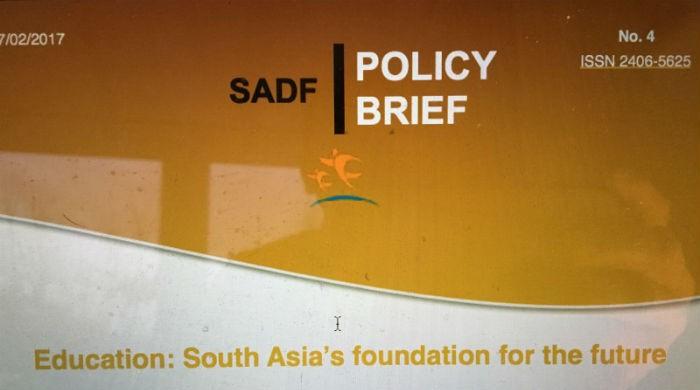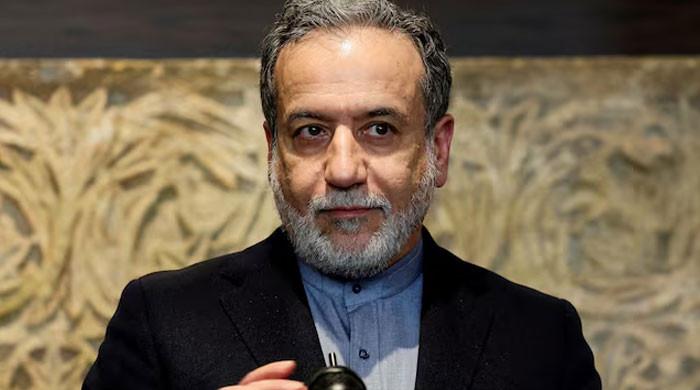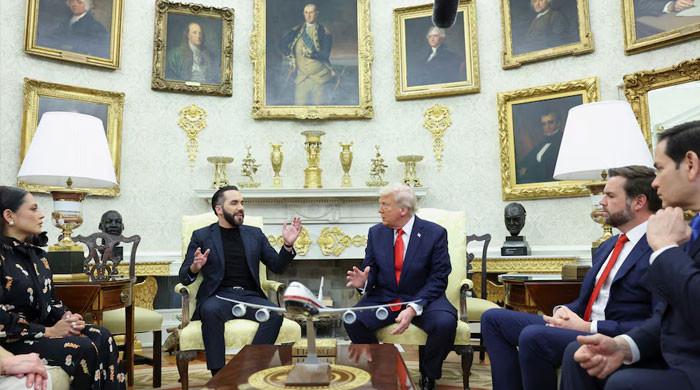Pakistan needs ‘inclusive, tolerant’ curriculum, says report presented in EU parliament
"Education: South Asia's Foundation for the future" proposed "quality knowledge, tolerant views, inclusive citizenship of all religions, ethnicities..."
March 06, 2017

A relatively imbalanced report presented in the European Union parliament by Brussels-based South Asian Democratic Forum (SADF) has pointed out religious seminaries of Pakistan as a major hindrance in promoting quality education in Pakistan.
The report "Education: South Asia's Foundation for the future", while recommending necessary steps such as a qualitative approach and teacher trainings, proposed "quality knowledge, tolerant views, inclusive citizenship of all religions, ethnicities and...[prevention of] any form of discrimination or fundamentalism."
The report asked the EU, United Nations and other international and national actors to be "diligent and ensure that they do not fund any organisation, instruments or officials that are in anyway involved in terrorism or promoting blatant fundamentalist positions". The corresponding section of the report, however, discusses primarily the religious seminaries of Pakistan.
The launching seminar instead of discussing the complex issues that impact on education in South Asia chose to put Pakistan in the dock and discussed mostly religious seminaries.
Pakistan clarifies situation on ground
Saqib Rauf, deputy head of Pakistan mission in Brussels, explained the situation on ground highlighting that besides madrassahs, Pakistan has a very well recognised education sector which could not be equated solely with religious seminaries.
He challenged the assertion that Pakistan's secondary class school textbooks contained anti-Hindu content and encouraged pupils to look down upon religious minorities. He acknowledged pre-partition history taught in schools as "a different story".
Even after presenting a clearer picture of the situation on ground, the mood of the seminar remained focused and selectively biased towards Pakistani religious seminaries as the reason for failure in the education sector.
A myriad of complicated issues were ignored, such as the urban-rural divide, the state’s low priority in spending in education and health sectors, and widespread corruption and poverty.
Rapid urbanisation a challenge for South Asia
The EU Public Affairs Consultant Laura De Silva observed that South Asian governments, especially India and Bangladesh, were facing difficulty to respond to organisational problems regarding access to schools due to growing urbanisation and under-developed rural areas. She also said that linguistic minorities faced problems studying in national languages.
Talking about drop-out rates and the level of the education, she said that one-fourth of primary school graduates of South Asia lacked basic literacy skills while India showed 20% decline in reading skills since 2008.
"20% of ten year olds cannot read simple words and 50% could not subtract", De Silva added.
She stressed on the need for improving the quality and quantity of teachers as according to a UNESCO report, South Asia needed 15 million trained teachers. She suggested efficiency in spending EU funds on education.
Mr. Brian Toll, who has worked as the European Commission's Directorate General on Education and Culture, tried to explain the EU policy towards funding in the education sector. He said EU relied on reports from the World Bank, UNESCO and other relevant forums. While emphasising on the importance of quality education he said, "because of low quality education, people are not getting jobs, which is hampering world development." Toll said that South Asian countries were not spending enough money on education.
Gender inequality in education sector
UNESCO representative Paolo Fontani mentioned gender inequality as a grave issue linked with low performance of South Asia in education sector. While pointing out specific problems of deeply conservative societies such as Afghanistan (31% literacy rate), he also stressed on the quality of teachers especially in madrassahs.
State of education in Pakistan
Citing Nasir Ahmed, head of National Education Management Information System in Pakistan, the report stated that Pakistan has 24 million out of school students, a poor net enrolment rate and a high dropout rate.
"Pakistan does not have the necessary infrastructure with 44% of the schools not having electricity supply, 34% not having drinkable water and 28% not having bathroom facilities,” said the report.
On the security front, the report claimed that 30% of schools have no boundary walls, citing the Taliban attack on Malala Yousufzai. It said that security of girl students was a major concern.
State of education in India, Bangladesh, Nepal
While lauding India’s Right of Children to Free and Compulsory Education Act 2009, the report noted that only 41% of the population under the age of 19 was attending public schools. "The cast system is one of the most visible dynamics of exclusion in India and Nepal. In Bangladesh, there is evidence that children from ethnic minorities face discrimination."
The report analysed how India introduced disciplines of Science, English and Social Studies over two decades ago, how just one province in Afghanistan was home to 300 unregulated seminaries and how Bangladesh’s National Education Policy was not adequate to face the challenges of terrorism, religious and ethnic intolerance.
Though imbalanced and loaded against Pakistan, the report does touch upon many issues facing Pakistan, such as terrorism and extremism. Aiming for the future, Pakistan must rethink how negligence benefits and strengthens the hands of its enemies.












